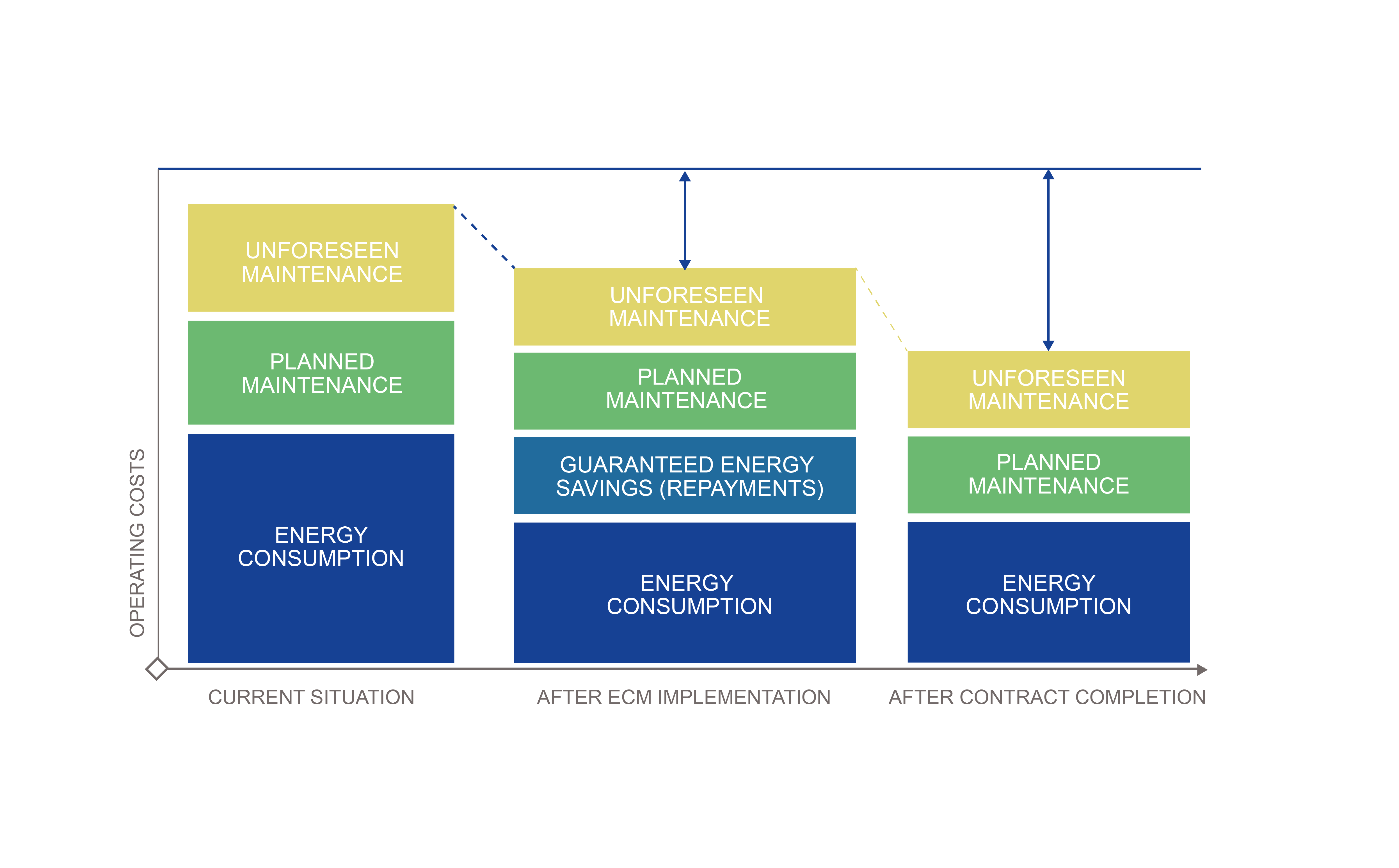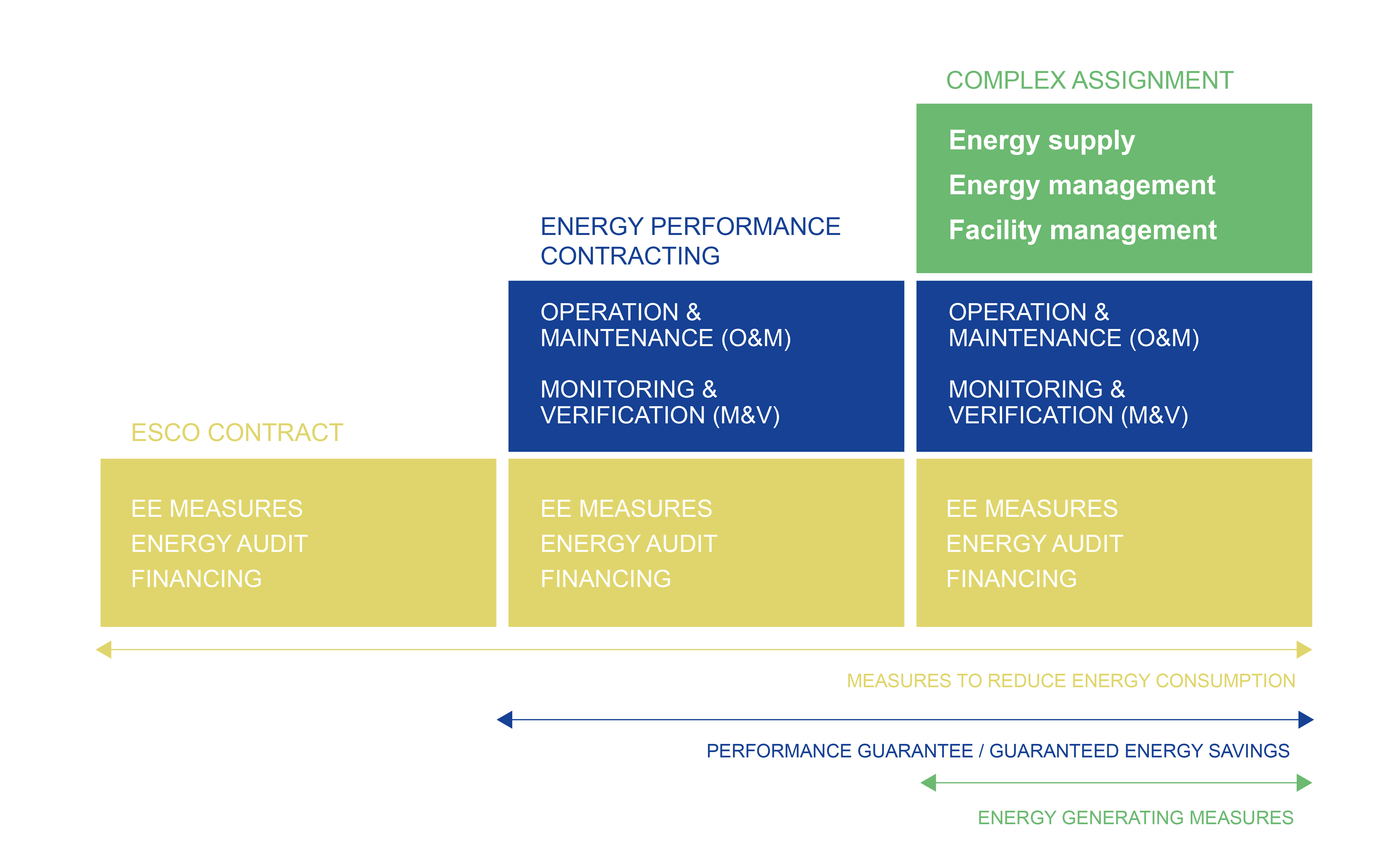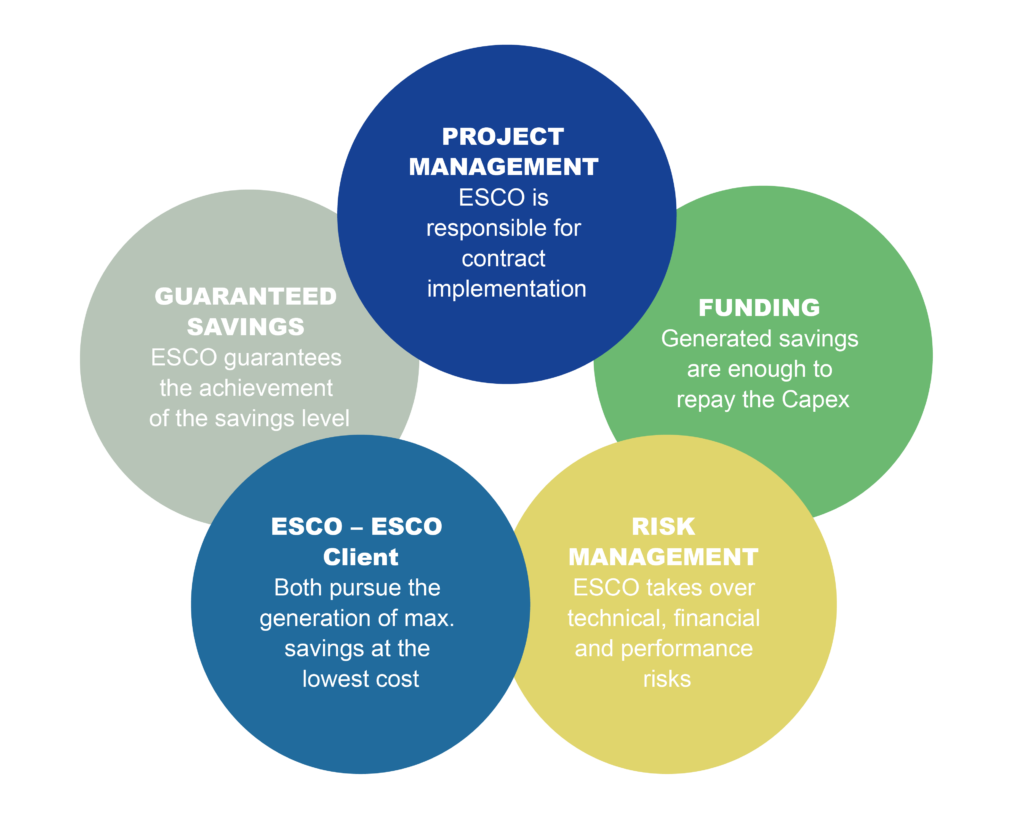Basic principles of ESCO and EPC
EPC rests on a series of basic principles, namely:
- The ESCO is responsible for the entire project implementation
- The ESCO takes ownership of risks; usually the technical, financial and performance risks are transferred to the ESCO
- The capital improvement which permits energy upgrades are funded from the generated savings with no additional costs for the facility owner/manager
- Both contractual parties have the same goal which is to ensure the optimal extent of investment with the resulted highest possible savings
- Under an EPC arrangement, the ESCO contractually guarantees the achievement of a certain level of savings.
An Energy Performance Contract (EPC) is a contractual agreement in which an Energy Service Company (ESCO) enhances the energy performance of a client’s facility by identifying and implementing Energy Conservation Measures (ECMs). The ESCO guarantees a specific level of energy savings and is responsible for the technical, financial, and performance risks associated with the project. This arrangement allows facility owners to improve the energy efficiency of their buildings without upfront capital investment, as the ESCO finances the project and is compensated from the savings generated over the contract period.
The ESCO provides comprehensive services, including the identification of energy improvements, financing, and turnkey installation of the necessary equipment. The savings in energy costs, as well as operational and maintenance (O&M) expenses, are guaranteed by the ESCO and serve as the basis for its compensation throughout the contract’s duration.
Typically, the ESCO assumes the technical, financial, and performance risks, while the facility owner is responsible for political and regulatory risks. The facility owner is obligated to pay for the services rendered by the ESCO from the achieved energy savings. If the contracted scope includes additional services such as O&M, an extra fee is charged accordingly.
Figure 2: Reduction of the operating costs after on EPC implementation.

Energy Service Companies (ESCOs) possess the essential expertise to deliver comprehensive, turnkey solutions throughout both the implementation and operational phases of energy efficiency projects. Their involvement typically results in substantial reductions in energy consumption and operations and maintenance (O&M) costs while also addressing various market-related challenges. ESCOs are equipped to manage the full scope of projects, including the mobilization of financial resources, the installation and maintenance of energy-saving technologies, and the assumption of associated technical, economic, and financial risks. Additionally, ESCOs often collaborate with other market participants to enhance project outcomes.
When engaging in Energy Performance Contracting (EPC), ESCOs assume performance risks by tying their compensation directly to the realized savings from the implemented energy efficiency (EE) measures. This performance-based compensation model inherently motivates ESCOs to deliver solutions that maximize energy savings.
Typically, ESCOs are responsible for monitoring the project’s performance, measuring, and verifying (M&V) the energy savings achieved. In more mature ESCO markets, these companies may also extend their services to include ongoing O&M, facility management (FM), and energy supply services, often through additional service agreements.
Partnering with an ESCO is a well-established strategy for both identifying and implementing Energy Conservation Measures (ECMs) while effectively managing the inherent risks associated with such projects. ESCOs offer a broad spectrum of services, ranging from initial energy audits to fully financed, turnkey projects that guarantee savings. A key feature of an ESCO’s offering is the performance contract, which transfers the project’s performance risk to the ESCO in return for a share of the savings generated by the project. This risk transfer aligns the ESCO’s interests with those of the client, ensuring a focus on achieving tangible, long-term energy savings.
Figure 3: Typical works and services included in EPCs

Working with Energy Service Companies (ESCOs) offers several key advantages, including enhanced facility performance, diverse project financing options, effective risk management, and access to specialized expertise, state-of-the-art equipment, and training—all with minimal or no upfront costs. Energy Performance Contracting (EPC) is applicable not only to individual facilities but also to entire portfolios, leveraging economies of scale for greater efficiency. This chapter outlines the benefits ESCOs provide and the critical factors to consider when selecting and engaging them.
ESCOs have traditionally served government markets effectively, but EPC has also proven to be a successful investment strategy in the private sector. As a tool for securing financing aimed at achieving energy savings, EPCs involve a contractual agreement between the facility owner or manager (the ESCO client) and the service provider (the ESCO). This agreement typically includes a structured repayment plan based on guaranteed energy savings, reduced operational and maintenance (O&M) costs, and/or the supply of energy at a predetermined price. The ESCO implements Energy Conservation Measures (ECMs) and uses the cost savings generated to repay the capital investment (CAPEX). If O&M services are included in the contract, the ESCO works to optimize and reduce these expenses (OPEX). Once the energy performance contract concludes, the facility owner retains 100% of the cost savings, both in terms of energy and O&M.
